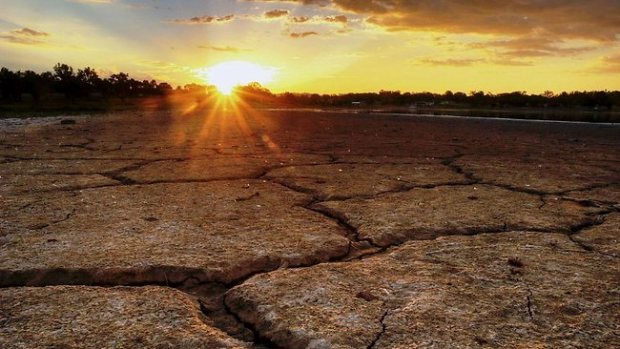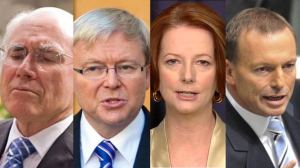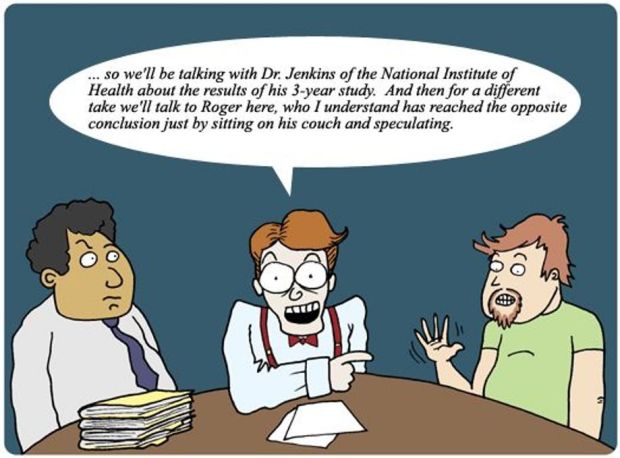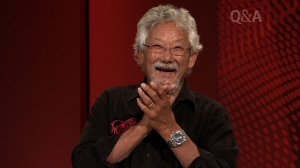
Source: Daily Telegraph Australia
In the last few years, Climate Change has often been reported in the media. Whilst it may seem like a good thing that the media is informing us about the latest science has to offer, there are often two major flaws in the way in which it is reported: the tendency to frame it only in a political context, and a false balance.
Reporting climate change as a political issue
Although there’s nothing wrong with this in itself, there is often a tendency to only report climate change as a governmental issue. This is due to a few reasons I think:

Australia’s 4 Prime Ministers of the last decade, all of whom were often the subject of climate change news reports. Source: Australian Broadcasting Corporation
- One of the news values is a focus on conflict. Perhaps journalists don’t think viewers will find enough conflict to interest them in the rising temperatures and they’d rather see climate change
as a disagreement between two politicians. - Two other news values are the notion of elite persons, and personalization. Perhaps climate change is framed in a political concept because if it is about elite people (politicians), it will be more interesting to readers.
- Ward (2009) speaks of the notion of ‘climate fatigue‘ that readers seem to
have. Perhaps this is another reason for the political framing – maybe journalists think their readers are sick of hearing the same statistics, and would rather see it framed in a fresh political context.
I think what might be needed is more reporting of climate change as both a scientific issue, and also as an issue that is effecting ordinary people across the world – such as those in the Pacific. As Mary Robinson, former United Nations High Commissioner for Human Rights has said: “A Climate Justice approach will amplify the voices of those people who have done least to cause climate change, but who are affected most severely by it.”
False Balance
Journalists generally adhere to a set of ethics. This is good in itself, but one aspect which often skews a report, although aiming for objectivity is the notion of balance. The issue is that in terms of climate change, 90% scientists believe it to be true, but journalists instead give climate change skeptics an equal voice.

Often the media gives a ‘false balance’ when reporting on issues such as climate change. Source: Understanding Science
A recent article on fair.org stated: “Balanced coverage does not, however, always mean accurate coverage. In terms of the global warming story, “balance” may allow skeptics—many of them funded by carbon-based industry interests—to be frequently consulted and quoted in news reports on climate change.”
This means in effect that many viewers who were originally receptive to the notion of climate change are now undecided, because they see the media’s coverage as evidence that scientists aren’t quite sure.
Last week on ABC1’s Q&A, Environmentalist David Suzuski said that this is “creating an imbalance, in fact, of reality. To the public it’s, “Oh, those scientists haven’t made up their mind yet.” …Otherwise you cherry pick the people that are speaking this side and that side.”

Canadian Climate Change Activist David Suzuki on ABC1’s Q & A last week. Source: Australian Broadcasting Corporation
So maybe it’s time our media reconsider how they report climate change.
References:
- Australian Broadcasting Corporation 2013, ‘Q & A: An Audience with David Suzuki’, Australian Broadcasting Corporation <http://www.abc.net.au/tv/qanda/txt/s3841115.htm> Accessed 01/10/2013
- Boykoff 2013, J & M ‘Journalistic Balance as Global Warming Bias’ Fairness and Accuracy in Reporting <http://fair.org/extra-online-articles/Journalistic-Balance-as-Global-Warming-Bias/> Accessed 01/10/2013
- Robinson, M 2010, ‘Statement on Women’s Leadership on Climate Justice’ The Mary Robinson Foundation – Climate Justice <http://www.mrfcj.org/pdf/2010_12_04_Statement_on_Women’s_Leadership_on_Climate_Justice.pdf> Accessed 01/10/2013
- Ward, B 2009, ‘Journalism ethics and climate change reporting in a period of intense media uncertainty’ Ethics in Science and Environmental Politics Vol 9, pp. 13 – 15
One comment